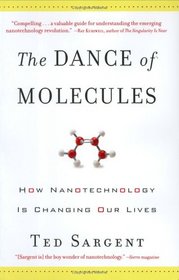This is without a doubt one of the worst non-fiction books I've ever read. It doesn't read like it was written by a nanotechnology researcher - it reads like it was written by Victorian-era fourteen year old girl with a HUGE CRUSH on a nanotech researcher.
Sargent is so caught up in making up "cool" metaphors for the concepts he's trying to get across that he completely neglects to actually explain the concepts. As an example, when he is talking about the nanoscale texture of a surface influences cell fate, he explains thusly: "For cells Bauhaus is Eros; Pei, Thanatos." I'm sorry, but an "explanation" that requires you to...
(1) parse that nightmare of a sentence
(2) know that Bauhaus and Pei are architects/schools of architecture
(3) know Greek mythology
...isn't really a useful teaching tool, since you pretty much need to already understand what he's talking about in order to wade through the purple prose.
Sargent suggests that nanotech can do pretty much anything more or less magically, but he doesn't mention a lot of the real problems and limitations with the technology, and he quickly dismisses potential safety concerns. In most cases, he doesn't even give you a feel for what is or is not currently possible - he'll talk about making nanoscale wheels without mentioning that no one has a way of linking them up to any other machinery. Additionally, he claims a lot of nanotechnology "advances" that I would say aren't nanotech at all - experiments which were straightforward biochemistry or combinatorial chemistry, and which the experimenters never claimed were nanotech.
Readers wanting to learn about nanotech are unlikely to get much useful information out of this book, other than the obvious fact that Sargent thinks that nanotech is way cool. They will also have to suffer through a lot of out-of-date pop references, flowery metaphors, and gushing hyperbole. I don't recommend it.
Sargent is so caught up in making up "cool" metaphors for the concepts he's trying to get across that he completely neglects to actually explain the concepts. As an example, when he is talking about the nanoscale texture of a surface influences cell fate, he explains thusly: "For cells Bauhaus is Eros; Pei, Thanatos." I'm sorry, but an "explanation" that requires you to...
(1) parse that nightmare of a sentence
(2) know that Bauhaus and Pei are architects/schools of architecture
(3) know Greek mythology
...isn't really a useful teaching tool, since you pretty much need to already understand what he's talking about in order to wade through the purple prose.
Sargent suggests that nanotech can do pretty much anything more or less magically, but he doesn't mention a lot of the real problems and limitations with the technology, and he quickly dismisses potential safety concerns. In most cases, he doesn't even give you a feel for what is or is not currently possible - he'll talk about making nanoscale wheels without mentioning that no one has a way of linking them up to any other machinery. Additionally, he claims a lot of nanotechnology "advances" that I would say aren't nanotech at all - experiments which were straightforward biochemistry or combinatorial chemistry, and which the experimenters never claimed were nanotech.
Readers wanting to learn about nanotech are unlikely to get much useful information out of this book, other than the obvious fact that Sargent thinks that nanotech is way cool. They will also have to suffer through a lot of out-of-date pop references, flowery metaphors, and gushing hyperbole. I don't recommend it.




